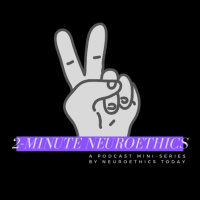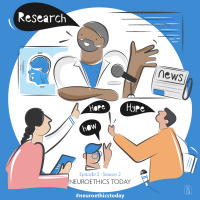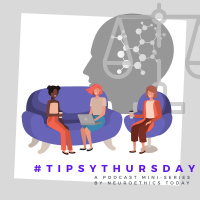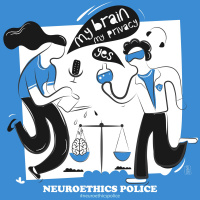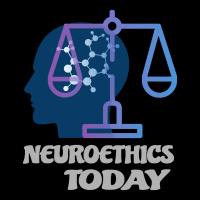Neuroethics Police
- Author: Vários
- Narrator: Vários
- Publisher: Podcast
- Duration: 27:40:30
- More information
Informações:
Synopsis
It's time for Neuroethics to make some arrests. Katherine Bassil, an upcoming neuroscientist and neuroethics enthusiast, has always tried to advocate for bridging the fields of neuroscience and neuroethics together. The absence of similar enterprises from the community makes it even more difficult for Katherine to achieve her goal. Join Katherine on her mission to show that being a neuroscientist and Neuroethics advocate, is the way for responsible brain innovation. The Neuroethics Police Podcast brings you interviews with experts in the field, where Neuroethics will question the science.
Episodes
-
2-minutes Neuroethics: What is the Ethics of Neuroscience?
24/03/2020 Duration: 01min2-minutes Neuroethics: What is the Ethics of Neuroscience? --- Send in a voice message: https://anchor.fm/neuroethicstoday/message
-
Andrew Neff - "Scientists are not always very transparent"
23/03/2020 Duration: 35minDuring Episode 2 of Season 2, we decided to discuss one of the most relevant topic in neuroscience and neuroethics: Science Communication. Katherine Bassil - founder and host - together with Dr. Andrew Neff - creator of Neuroscience from Underground - discuss the importance of science communication, its challenges and pitfalls. We covered questions such as: What are the faux-pas of researchers, journalists, and the consumer (or the general public) in science communication of neuroscience research? What are the implications of uninformed consumers? What can scientists do to better communicate their science in a transparent, honest, and correct way? This episode is just the ride dose of neuroethics for you this month. Useful Links: Neuroethics Today website Neuroethics Today on Twitter Neuroethics Today on Instagram Neuroethics Today Merch Neuroethics Today Blog (new!) --- Send in a voice message: https://anchor.fm/neuroethicstoday/message
-
#TIPsyThursday: Morality Pill as Treatment?
12/03/2020 Duration: 28minWe are launching our podcast mini-series #TIPsyThursday* to discuss the 'Morality Pill'. Host Katherine, together with co-hosts Mariel and Susan have an open discussion about what is a 'Morality Pill', what "issues" can be associated with this pill, who should consider taking it, should it be given as 'treatment', and much more questions raised. Key takeaways: 1. Morality is not located in ONE brain region and hence is not an ON or OFF switch. 2. Morality has deep roots in culture and hence will not be viewed similarly across countries. 3. Consuming a Morality Pill will highly depend on the case study at hand. 4. Morality Pill may be science-fiction but there are several similar 'cognitive enhancers' on the market, so we should be having this conversation ?NOW! *#TIPsyThursday is an informal mini-series by Neuroethics Today where host Katherine Bassil and co-hosts Mariel Kalkach and Susan Kravitz have an open conversation about all things neuroethics including technologies that exist, do not exist, and
-
What the he** is Neuroethics?
03/02/2020 Duration: 28minWith the launch of Season 2, we are taking you back to the roots (or shall we say, to the bottom of the ocean). Katherine Bassil - founder and host - together with episode 1 co-hosts Mariel Kalkach and Susan Kravitz discuss what is Neuroethics and why YOU should care! Have you ever wondered about the relationship between Neuroethics and the ocean? Were you ever skeptical about your involvement in Neuroethics? Have you ever wondered how you can contribute? This episode is just the ride dose of neuroethics for you. Not too much information, just the right dose for your curious mind, and the perfect content to stimulate your critical attitude! Useful links: Neuroethics Today website Neuroethics Today on Twitter Neuroethics Today on Instagram Neuroethics Today Merch Neuroethics Today Blog (new!) --- Send in a voice message: https://anchor.fm/neuroethicstoday/message
-
12 Neuroethics Lessons from 12 Neuroethics Discussions
30/12/2019 Duration: 39minDuring episode 13, Katherine Bassil shares 12 neuroethics lessons from 12 neuroethics discussions that took place on season 1 of the Neuroethics Police podcast. Katherine also answers questions from the audience and finishes off by announcing the winner of the Instagram #neuroethicsmeme Giveaway! Find out more details on episode 13 - the final episode of season 1 - of the Neuroethics Police podcast! N.B. This episode also includes a special announcement about the 2020 annual meeting of the Italian Neuroethics Society. Useful links: Neuroethics Police website Neuroethics Police on Twitter Neuroethics Police on Instagram Become a Patreon Neuroethics Police Merch --- Send in a voice message: https://anchor.fm/neuroethicstoday/message
-
Laurens Landeweerd - "You never know when Science Fiction becomes Science Fact."
25/11/2019 Duration: 45minLaurens Landeweerd joins host Katherine Bassil in discussion on the ethical implications of human and cognitive enhancement, a topic that has been buzzing on all media platforms for the last couple of years. In the first part of this episode, Laurens answers questions on lifespan extension and living "forever" from a philosophical point of view. In the second part, he shares with us his insights on cognitive enhancement. Finally, Laurens sheds light on current debates in the field of genetic editing, particularly with developments in the revolutionary technology "CRISPR". Why do humans want to live forever? Should humans want to live forever? Will cognitive enhancers create societal inequalities? Are we playing God? Is Laurens optimistic or pessimistic about the future? We finish off by overing exciting and up-to-date neuroethics news. Find out more details on episode 12 of the Neuroethics Police podcast! Who is Laurens Landeweerd? Laurens is a philosopher. He holds a position as assistant professor at Radbou
-
Yasin Temel - "Your personality is everything, but for each individual it's different."
28/10/2019 Duration: 38minYasin Temel joins host Katherine Bassil in discussion on the ethical implications of deep brain stimulation (or DBS), a neurotechnology that has been the number one therapeutic strategy for brain disorders like Parkinson's disease. In the first part of this episode, Yasin elaborates on what is DBS and how is it being used in the clinics nowadays. In the second part, he shares with us how patients feel towards carrying this brain implant for the rest of their lives and whether they develop any kind of attachment to it once it is removed. Finally, Yasin sheds light on changes in personality that can accompany DBS surgery, while revisiting a peculiar case of one of his former patients. What is DBS? Do patients carry some kind of resistance towards this brain device? Can DBS lead to personality changes? Will patients face a dilemma: sacrificing their personality to combat the burden of disease? Find out more details on episode 10 of the Neuroethics Police podcast! --- Send in a voice message: https://anchor.fm
-
Andrea Lavazza - "As a philosopher, I am proud of this."
30/09/2019 Duration: 58minAndrea Lavazza joins host Katherine Bassil in discussion on the ethical implications of cerebral or brain organoids, a technology that has been developing with high speed ever since its conception. In the first part of this episode, Andrea elaborates on the thought experiment of the philosopher Hilary Putnam on "brains in a vat" and explains why brain organoids carry ethical implications, stressing on what is hope and what is hype. In the second part, we discuss in detail the implications of a recent study where brain function was restored after death. Finally, Andrea sheds light on the importance of focusing on current issues including privacy and commercialization. Are human brain organoids conscious? Will brain organoids aid in the redefinition of life and death? What does the public think of using brain organoids for research? What is the role of scientists, ethicists, journalists and the public in guiding developments in this field? Find out more details on episode 10 of the Neuroethics Police podca
-
Marcello Ienca - "Neuroethics is not about policing on Neuroscience"
02/09/2019 Duration: 01h13minMarcello Ienca joins host Katherine Bassil in discussion on the implementation of new “neuro” human rights with newly emerging neurotechnologies. In the first part of this episode, Marcello explains why our societies are in need of new human rights in a day where we are witnessing a neurotechnology revolution. In the second part, we discuss in detail the implications of emerging neurotechnologies and why it is important to protect the consumer against misuse. Finally we shed light on Marcello’s opinion on a group that has already taken action based on his suggestions for new human rights, by formulating a petition to congress. Are emerging neurotechnologies threatening our human rights? Are we moving towards a neurotech-anxious society? Will neurotechnologies create inequalities within society? Why are the new human rights needed to protect us from emerging neurotechnologies? Find out more details on episode 9 of the Neuroethics Police podcast! In this episode: Towards new human rights in t
-
Saskia Valk - "The artist is a bridge builder between two distant worlds"
29/07/2019 Duration: 42minSaskia Valk joins host Katherine Bassil in discussion on science communication through ART. In the first part of this episode, Saskia takes us into her world of interdisciplinary art, where she works along with philosophers, scientists and other stakeholders in training upcoming artists to bridge the fields of science, technology and other societal issues. In the second part, we discuss the involvement and importance of artists in communicating science and its practices with a wider non-expert yet implicated audience. Can Art translate science to the wider public? Can Art bridge the worlds of scientists with the general public? Does Art carry a responsibility to communicate science? Find out more details on episode 8 of the Neuroethics Police podcast! In this episode: Broadening Science through Art - Synergy Lessons I've learned from creating a science podcast - Nature Send a voice message to the Neuroethics Police podcast iArts Maastricht Sensations exhibition - Museum Dr. Guislain 2018 Photo
-
David Roef & Antonia Waltermann - "You reduce a person to a brain, you keep them out of the courtroom."
01/07/2019 Duration: 01h24minProf. dr. David Roef & Dr. Antonia Waltermann join host Katherine Bassil in discussion on neurolaw. In the first part of this episode, we discuss the involvement of neuroscience in the courtroom. In the second part, we delve into philosophical concepts such as free-will and neuroscience. Finally, we discuss how neuroscientific findings can be used to reshape current policies, focusing on criminal cases of juveniles. Can Neuroscience be misused in the courtroom? Did Neuroscience Destroy Free Will? Can Neuroscience influence Criminal Policies? Find out more details on episode 7 of the Neuroethics Police podcast! In this episode: The Documentary Neurolaw and Order --- Send in a voice message: https://anchor.fm/neuroethicstoday/message
-
Matthew L. Baum - "We change our behavior knowing it might rain"
10/06/2019 Duration: 01h01minDr. Matthew L. Baum joins Sophie Okolo and host Katherine Bassil in discussion on the neuroethics of biomarkers. Focusing on major concepts discussed in his book "The Neuroethics of Biomarkers", Matthew explains the motive behind it all. From discussing pre-disorders, limitations in current diagnostic manuals and the concept of moral responsibility, this episode highlights the implications of biomarkers in our daily lives. Are you held accountable if you were involved in a car accident, knowing you were at higher risk of having a seizure? Find out more details on episode 6 of the Neuroethics Police podcast! --- Send in a voice message: https://anchor.fm/neuroethicstoday/message
-
Open discussion - Head transplants and beyond
05/05/2019 Duration: 51minNeuroscience PhD candidates Clara Snijders, Jackson Boonstra, Megan Sieg and Masters student Ieva Gembutaite joined the Neuroethics Police in an open discussion. In this episode, several ethical and societal implications were discussed concerning recent neuroscience research, including keeping pig brains "alive", human brain organoids, brain-computer interfaces (or BCI), artificial intelligence (or AI) and last but not least human head transplants. During this open discussion the ethical and societal implications of similar research were raised with more questions asked than answered. What neuroscience research keeps you awake at night? --- Send in a voice message: https://anchor.fm/neuroethicstoday/message
-
Dorothee Horstkötter - "My journey led me out of the office and into a prison"
29/03/2019 Duration: 45minAssistant Professor Dorothee Horstkötter discusses the neuroethics of forensic psychology and psychiatry focusing on her previous experience with juvenile delinquents in the Netherlands. With a background in practical philosophy and applied bioethics, Dr. Dorothee highlights the problematic implications of forensic psychology and psychiatry. She also provides a critical perspective on introducing artificial intelligence in the courtroom. --- Send in a voice message: https://anchor.fm/neuroethicstoday/message
-
Daniël van den Hove - "We should not want to live forever"
25/02/2019 Duration: 31minAssociate Professor Daniël van den Hove discusses the neuroethics of biomarkers in Alzheimer's Disease and Depression, accompanied by a short trip into the future. --- Send in a voice message: https://anchor.fm/neuroethicstoday/message
-
Introduction - "I took upon myself to raise awareness"
03/02/2019 Duration: 10minWhy Neuroethics Today? Who is the host? Learn more about the motive behind this podcast, and what to expect. --- Send in a voice message: https://anchor.fm/neuroethicstoday/message
-
Jos Prickaerts - "The train left the station without us"
21/01/2019 Duration: 24minProfessor Jos Prickaerts discusses his relationship with neuroethics including the challenges he encouters as a scientist, and the importance of neuroethics training. --- Send in a voice message: https://anchor.fm/neuroethicstoday/message

